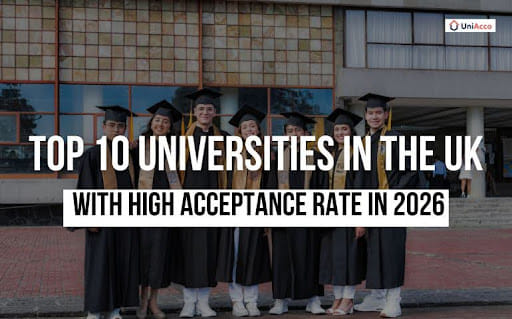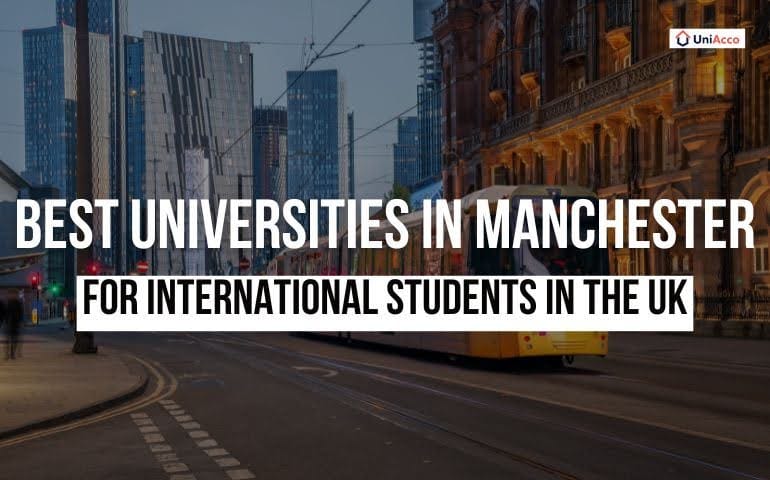Thinking of pursuing your MS in the UK? The UK is home to some of the world’s most prestigious universities, offering advanced courses, globally recognised degrees, and a multicultural experience. Whether you are aiming for a research-led programme or a career-focused course, the UK ticks all the right boxes.
With a smooth application process, multiple intake options, and an extensive choice of subjects, studying in the UK offers academic excellence and international exposure. In this blog, we will break down everything you need to know about pursuing a Master’s in the UK—along with a closer look at the top universities in the UK for MS you should consider.
Why Choose the UK for Your MS?
Before we look into the best universities for Master’s in the UK, here’s why the UK is such a popular choice for postgraduate studies:
- One-Year Degrees: Most UK MS programmes are completed in just 12 months, saving time and cost.
- Globally Recognised Qualifications: UK Master’s degrees hold global credibility, making them highly valuable in international job markets.
- Research and Innovation: Many UK universities are global leaders in research output and funding.
- Career Boost: Master’s graduates in the UK earn significantly more than bachelor’s degree holders—on average, £6,000 to £6,500 more per year.
- Multicultural Exposure: With students from over 180 countries, UK campuses offer a diverse learning environment.
Top Universities For Masters In The UK
The UK hosts some of the world’s top universities, known for academic excellence, research strength, and global career opportunities. This makes it a top choice for master’s studies. Here’s a list of the top colleges in the UK for Master’s and their QS World ranking for 2025.
| University | QS World Ranking 2025 | Why It’s Great for MS |
| Imperial College London | 2 | Ideal for Engineering, Computing, and Data Science |
| University of Oxford | 3 | Globally ranked across disciplines, especially Law, Public Policy, and Sciences |
| University of Cambridge | 5 | Strong research-led programmes and an innovation focus |
| University College London (UCL) | 9 | Popular for MS in Architecture, Psychology, and Life Sciences |
| University of Edinburgh | 27 | Renowned for AI, Informatics, and Public Health |
| University of Manchester | 34 | Great industry links for Business, Engineering, and Social Sciences |
| King’s College London | 40 | Highly rated for Health Sciences, Law, and Humanities |
| London School of Economics (LSE) | 50 | Best for Economics, Finance, and Political Science |
| University of Glasgow | 78 | Strong MS programmes in Engineering and Veterinary Sciences |
| Queen Mary University of London | 120 | Great for MS in Law, Medicine, and Computer Science |
Top 10 Universities For Masters In The UK
Discover the leading universities in the UK, renowned for their exceptional postgraduate programmes. These institutions offer world-class education, advanced research opportunities and strong industry connections, making them ideal choices for your master’s studies.
Imperial College London
Imperial College London is a world-leading university specialising in science, technology, engineering, medicine, and business (STEMB). It is renowned for its advanced research and innovation, emphasising scientific imagination leading to global impact.
| Top Courses | Acceptance Rate (%) | Postgraduate Admission Requirements | Approx. Fees (Postgrad) |
| Engineering, Medicine, Business, Natural Sciences | 14% | Bachelor’s with 2:1 or equivalent; Master’s with grade 4/5+ for PhD; Some courses may require entrance tests | £28,000 – £45,000/year |
University of Oxford
The University of Oxford, founded in the 12th century, is the oldest in the English-speaking world. It is globally recognised for its academic excellence, tutorial-based teaching, and rich tradition of scholarship. Oxford comprises 38 independent colleges and is noted for its high graduate employability and extensive library resources.
| Top Courses | Acceptance Rate (%) | Postgraduate Admission Requirements | Approx. Fees (Postgrad) |
| PPE, Law, Medicine, Engineering, Economics | 17% | Bachelor’s with 2:1 or equivalent; Relevant degree with strong academic record; Some courses require entrance exams (e.g., GRE, LNAT, BMAT) | £25,000 – £45,000/year |
University of Cambridge
Founded in 1209, the University of Cambridge is the world’s third-oldest university. It is a collegiate research university with 31 autonomous colleges and a strong focus on small-group supervision. Cambridge is renowned for its rigorous academic programs and extensive research output.
| Top Courses | Acceptance Rate (%) | Postgraduate Admission Requirements | Approx. Fees (Postgrad) |
| Engineering, Medicine, Law, Natural Sciences, Economics | 21% | Bachelor’s with 2:1 or equivalent; Master’s with high grades; Some courses require interviews and entrance exams | £28,000 – £45,000/year |
University College London (UCL)
UCL is the largest college of the University of London and one of the UK’s leading research universities. Founded in 1826 as a secular institution, it has over 100 departments and research centres across diverse disciplines. UCL was the first university in England to admit women on equal terms with men.
| Top Courses | Acceptance Rate (%) | Postgraduate Admission Requirements | Approx. Fees (Postgrad) |
| Engineering, Law, Medicine, Economics, Social Sciences | 50 | Bachelor’s degree with 2:1 or equivalent; Course-specific requirements may apply | £20,000 – £40,000/year |
University of Edinburgh
Founded in 1583, the University of Edinburgh is one of Scotland’s most prestigious universities. It offers a wide range of programs across the arts, humanities, sciences, medicine, and engineering, and it has multiple campuses in the city. Edinburgh is known for its research excellence and historic academic traditions.
| Top Courses | Acceptance Rate (%) | Postgraduate Admission Requirements | Approx. Fees (Postgrad) |
| Medicine, Law, Engineering, Informatics, Business | 40 | Bachelor’s degree with 2:1 or equivalent; Some courses may require additional tests or experience | £19,000 – £35,000/year |
University of Manchester
The University of Manchester is a major public research university formed in 2004 through a merger. It is one of the UK’s largest universities by enrollment and is a member of the Russell Group. Manchester is notable for its Nobel laureates and extensive cultural assets, including museums and libraries.
| Top Courses | Acceptance Rate (%) | Postgraduate Admission Requirements | Approx. Fees (Postgrad) |
| Engineering, Business, Computer Science, Medicine | 55 | Bachelor’s degree with 2:1 or equivalent; Some courses may require entrance exams or work experience | £18,000 – £35,000/year |
King’s College London
King’s College London is an internationally renowned university known for its outstanding education and research. It offers a wide range of programs and is dedicated to advancing knowledge across disciplines, including health sciences, law, humanities, and social sciences.
| Top Courses | Acceptance Rate (%) | Postgraduate Admission Requirements | Approx. Fees (Postgrad) |
| Medicine, Law, Psychology, Business, International Relations | 55 | Bachelor’s degree with 2:1 or equivalent; Course-specific tests may apply | £20,000 – £40,000/year |
London School of Economics (LSE)
LSE is a world-leading institution specialising in social sciences. Founded in 1895, it offers undergraduate, master’s, and doctoral programs in economics, politics, sociology, law, and related fields. LSE has a diverse international student body and a strong reputation for research and policy impact.
| Top Courses | Acceptance Rate (%) | Postgraduate Admission Requirements | Approx. Fees (Postgrad) |
| Economics, Finance, Law, Political Science, Management | 27 | Bachelor’s degree with 2:1 or equivalent; Some courses require GRE/GMAT; strong academic record essential | £22,000 – £42,000/year |
University of Glasgow
Founded in 1451, the University of Glasgow is one of the oldest universities in the English-speaking world and a leading Scottish institution. It offers a wide range of programs with a strong research focus and is known for its motto “The Way, The Truth, The Life”.
| Top Courses | Acceptance Rate (%) | Postgraduate Admission Requirements | Approx. Fees (Postgrad) |
| Medicine, Engineering, Law, Business, Life Sciences | 70 | Bachelor’s degree with 2:1 or equivalent; Additional requirements vary by course | £17,000 – £30,000/year |
Queen Mary University of London
Queen Mary University of London is a member of the Russell Group and offers a broad spectrum of undergraduate and postgraduate courses. It is recognized for its research excellence and vibrant campus life in the heart of London.
| Top Courses | Acceptance Rate (%) | Postgraduate Admission Requirements | Approx. Fees (Postgrad) |
| Law, Medicine, Engineering, Business, Humanities | 65 | Bachelor’s degree with 2:1 or equivalent; Some courses may require additional tests or experience | £18,000 – £30,000/year |
Eligibility Criteria for MS in the UK
To apply to the best universities in UK for MS, you typically need:
- Bachelor’s Degree: A UK equivalent of 2:2 (60% or higher); 2:1 or above for competitive courses.
- English Language Test: IELTS, TOEFL, PTE, or Duolingo.
- GRE/GMAT: Required for some programmes like MBA or Economics.
- Work Experience: Needed for professional degrees like MBA.
- Student Visa & Passport: Mandatory for international students.
Documents Required
- Completed online application form
- Academic transcripts and degree certificates
- Valid English proficiency test scores
- Two letters of recommendation (academic or professional)
- Statement of Purpose (SOP) outlining goals and motivation
- Updated CV/Resume
- Research proposal or portfolio (if applicable)
- Passport and visa-related documents
Any additional documents like test scores, proof of funds, or a birth certificate, if requested by the university
Also Read: University Application Process – A Guide
Types Of Master’s Programmes In The UK
The UK offers various programmes for those looking to pursue an MS in the UK. Whether you want to deepen theoretical knowledge, enhance career prospects or prepare for a research or industry-focused career, there’s a degree to match. Here are the most common types:
| Degree Type | Field/Focus Area | Key Features |
| Master of Arts (MA) | Arts, Humanities, Social Sciences | Theoretical and critical study, often essay and research-based |
| Master of Science (MSc) | Science, Technology, Social Sciences | A mix of practical and theoretical work, with research elements included |
| Master of Business Administration (MBA) | Business & Management | Professional degree with leadership and business skills; work experience needed |
| Master of Engineering (MEng) | Engineering | Advanced technical training may lead to chartered engineer status |
| Master of Laws (LLM) | Law | Specialisation in legal fields, for those with a prior law degree |
| Master of Social Science (MSSc) | Social Sciences, Human Behaviour | Prepares for careers in research, consultancy, or social work |
| Master of Research (MRes) | Various | Heavy research focus; ideal for PhD preparation |
| Master of Fine Arts (MFA) | Creative Arts (e.g. Theatre, Design, Writing) | Practice-based learning in creative disciplines |
| Integrated Master’s | STEM (e.g. MEng, MSci, MPhys, MChem) | Combining undergraduate and master’s studies in a single extended course |
Scholarships For MS in UK
Pursuing a master’s degree in the UK can be a significant investment, but numerous scholarships are available to help ease the financial burden. Many UK universities and government-backed programmes offer generous funding options for international students based on merit, need, or nationality. Below is a list of some well-known scholarships available for master’s students.
| Scholarship Name | Value | Eligibility/Details |
| GREAT Scholarships | £10,000 | For students from 18 countries at 71 UK universities |
| UCL Global Master’s Scholarship | £15,000 | Up to 85 awards for international students from lower-income backgrounds |
| Bristol Think Big Scholarship | Up to £26,000 + £3,000 booster | For overseas fee-paying postgraduate students |
| University of Sheffield Scholarships | £10,000 | 75 awards for high-achieving international students |
| Chevening Scholarships | Fully funded | Covers tuition, living costs, and travel for any UK master’s programme |
| Manchester GREAT Scholarships | £10,000 | Available to students from selected countries |
| UEL International Scholarships | £500–£5,000 | Tuition discount is automatically considered upon application |
Also Read: Top List of Best Universities in the UK for International Students | UniAcco
Studying for a Master’s degree in the UK is an investment that provides world-class education and opens doors to a wealth of opportunities across global industries. Whether you want to enhance your career, gain valuable international exposure, or immerse yourself in advanced research, the UK offers diverse academic programmes and top-ranked universities to help you achieve your goals.
Once you have secured your university spot, let UniAcco help you find the perfect student accommodation in the UK. Start your journey today with UniAcco, your trusted partner in student housing.
FAQs
What is the cost of pursuing an MS in the UK?
The cost of pursuing a master’s degree in the UK typically ranges from £9,000 to £35,000 per year, depending on the university, course, and location. On average, students can expect to spend around £22,000 annually on tuition fees alone.
What is the duration of an MS degree in the UK?
An MS degree in the UK typically takes 1 year for full-time students, while part-time programmes can take 2 to 4 years, depending on the student’s schedule.
Which are some of the best unis for masters in the UK?
Some of the top universities for a Master’s degree in the UK include the University of Oxford, the University of Cambridge, Imperial College London, UCL, the University of Edinburgh, King’s College London, and the London School of Economics (LSE). These institutions are renowned for their academic excellence and offer various postgraduate programmes.
How long does an MS take in the UK?
Full-time programmes typically last 1 year, while part-time options may take 2–4 years.















0 Comments